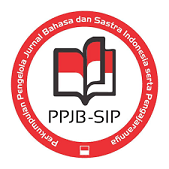PENGARUH PENERAPAN MODEL PEMBELAJARAN KOOPERATIF TIPE PROBLEM POSING TERHADAP HASIL BELAJAR MENULIS CERITA FABEL PADA SISWA KELAS VII SMP NEGERI 2 SAWAN TAHUN PELAJARAN 2018/2019
DOI:
https://doi.org/10.23887/jjpbs.v9i1.20268Abstract
Penelitian ini bertujuan untuk mengkaji hasil belajar menulis dan pengaruh penerapan model pembelajaran kooperatif tipe problem posing. Penelitian ini menggunakan rancangan eksperimen semu, post test only control group design. Kelompok eksperimen pada penelitian ini adalah kelas VII H dan kelompok kontrol adalah kelas VII G. Data dikumpulkan dengan menggunakan tes dalam bentuk penugasan berupa penulisan cerita fabel. Data dianalisis melalui uji prasyarat, menggunakan uji-t sampel independent (tidak berkorelasi) dengan kriteria pengujian jika thitung > ttabel maka H1 diterima dan H0 ditolak. Hasil perhitungan uji-t, diperoleh thitung sebesar 5,48. Sementara, ttabel dengan taraf signifikan 5% dan db = n1 + n2 -2adalah 1,67. Ini berarti, thitung lebih besar dari ttabel (thitung > ttabel) sehingga Ho ditolak dan H1 diterima. Dengan demikian, perbedaan hasil belajar menulis cerita fabel kedua kelompok signifikan. Hasil perhitungan uji-t yang signifikan, menunjukkan bahwa ada pengaruh model pembelajaran kooperatif tipe problem posing terhadap hasil belajar menulis cerita fabel.
Downloads
Published
Issue
Section
License
Authors who publish with the Jurnal Pendidikan Bahasa dan Sastra Indonesia Undiksha agree to the following terms:- Authors retain copyright and grant the journal the right of first publication with the work simultaneously licensed under a Creative Commons Attribution License (CC BY-SA 4.0) that allows others to share the work with an acknowledgment of the work's authorship and initial publication in this journal
- Authors are able to enter into separate, additional contractual arrangements for the non-exclusive distribution of the journal's published version of the work (e.g., post it to an institutional repository or publish it in a book), with an acknowledgment of its initial publication in this journal.
- Authors are permitted and encouraged to post their work online (e.g., in institutional repositories or on their website) prior to and during the submission process, as it can lead to productive exchanges, as well as earlier and greater citation of published work. (See The Effect of Open Access)







